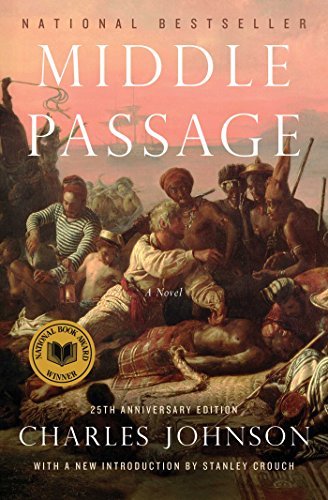What do you think?
Rate this book


209 pages, Paperback
First published January 1, 1990

Only an inexplicable calm, as if I were the sea now, the dam of my tears--the poisons built up since I left southern Illinois--burst & I cried for the sewage I carried in my spirit, my failures, my crimes, foolish hopes & vanities, the very faults & structural flaws in the blueprint of my brain. I could no longer find my loyalties.There are images in Middle Passage that reminded me of other novels, Moby Dick among them, with an almost imperial Allmuseri figure named Ngonyama tending the ship's wheel during a final crippling storm and a wealth of philosophical references one hardly envisions on such a ship. At one point, Rutherford sizes up the fate of the ship & intones, "deep down no man's democratic-we're just closet anarchists" and also "this was not a ship but a coffin." In spite of this, the author suggests that Rutherford Calhoun and all of the other characters, including the Allmuseri have been changed by the voyage, with the would-be slaves no longer Africans but not yet Americans and with "no one able to stop the terrible forces & transformations our voyage had set free."
All bonds, landside or on ships, between masters & mates, women & men, it struck me, were a lie forged briefly in the name of convenience & just as quickly broken. I'd brought a world of grief on myself but, hang it, I wished like hell I had someone to blame--my parents, the Jackson administration or white people in general for this tangle of predicaments.

As I remembered home, it was a battlefield, a boiling cauldron. It created white rascals like Ebenezer Falcon, black ones like Zeringue, uppity Creoles, hundreds of slave lords, bondmen crippled & caricatured by the disfiguring hand of servitude. Nay, the States were hardly the sort of place a Negro would pine for, but pine for them I did. I was ready now after months at sea for the strangeness & mystery of black life, even for the endless rounds of social obstacles, trials & challenges colored men faced every blessed day of their lives, for there were indeed triumphs that balanced the suffering the suffering on shore, small yet enduring things.In 2006, when I hosted a longtime book discussion group with a pairing of Middle Passage & Melville's Billy Budd, I noticed that Charles Johnson had grown up within walking distance of my home & sent off an invitation to join our gathering, if by some extreme chance he happened to be in the area visiting relatives at that time. Prof. Johnson, then teaching at the University of Washington, emailed his regrets but included some very interesting photo images of slave ships that might have resembled the one on which his own novel was set, a very nice gesture, with the images of great benefit during our discussion of Middle Passage.
If this weird upside-down caricature of a country called America, if this land of refugees & former indentured servants, religious heretics & half-breeds, whoresons & fugitives--this cauldron of mongrels from all points of the compass--was all I could rightly call home, then aye: I was of it.
If this weird, upside-down caricature of a country called America, if this land of refugees and former indentured servants, religious heretics and half-breeds, whoresons and fugitives—this cauldron of mongrels from all points on the compass—was all I could rightly call home, then aye: I was of it. […] Do I sound like a patriot? Brother, I put it to you: What Negro, in his heart (if he's not a hypocrite), is not?Through his characters, Johnson gently mocks Afrocentrism and related reductive forms of identitarian rebellion, while being quite clear about the horrifying circumstances that made and make them seem reasonable or necessary. The Allmuseri, Calhoun observes, have been changed by their experiences—thus, there is no possibility of their recovering a pure, unspoiled essence—and they have moreover made themselves over in the image of their oppressors in the course of their revolution, seeking power and purity and so denying the world's Heraclitean flux. They thus betray the best of their own worldview, which is incarnated in their language: "Nouns or static substances hardly existed in their vocabulary at all." Their revolt has turned them into nouns.
"The Allmuseri god is everything, so the very knowing situation we mortals rely on—a separation between knower and known—never rises in its experience. You might say empirical knowledge is on man's side, not God's."But Falcon elsewhere in the novel explains to Calhoun the logical terminus of the separation between knower and known (Johnson, by the bye, has a Ph.D. in philosophy):
“Conflict,” says he, “is what it means to be conscious. Dualism is a bloody structure of the mind. Subject and object, perceiver and perceived, self and other—these ancient twins are built into the mind like the steam-piece of a merchantman. We cannot think without them, sir. And what, pray, kin such a thing mean? Only this, Mr. Calhoun: They are signs of a transcendental Fault, a deep crack in consciousness itself. Mind was made for murder. Slavery, if you think this through, forcing yourself not to flinch, is the social correlate of a deeper, ontic wound.”*Calhoun's narrative challenges Falcon's view: the novel itself (not only this one, but the very form) is therapy for philosophy, having more in common with the Allmuseri's all-embracing worldview. The novel undoes the distinctions dualistic philosophy makes—between high and low style, between Africa and America, between past and present**—and allows Rutherford Calhoun to stop merely reacting and instead become a free man in free relations with others, wide as "countless seas of suffering."